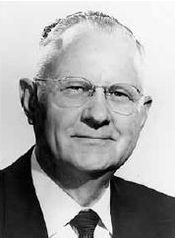Delbert L. Stapley
| Delbert L. Stapley | |
|---|---|
 |
|
|
|
|
| Quorum of the Twelve Apostles | |
| October 5, 1950 – August 19, 1978 | |
| LDS Church Apostle | |
| October 5, 1950 – August 19, 1978 | |
| Reason | Death of George F. Richards |
| Reorganization at end of term |
James E. Faust ordained |
| Personal details | |
| Born |
Delbert Leon Stapley December 11, 1896 Mesa, Arizona Territory, United States |
| Died | August 19, 1978 (aged 81) Salt Lake City, Utah, United States |
Delbert Leon Stapley (December 11, 1896 – August 19, 1978) was a member of the Quorum of the Twelve Apostles of The Church of Jesus Christ of Latter-day Saints from 1950 to 1978.
Stapley was born in Mesa, Arizona Territory. As a youth, he rejected a chance at playing Major League Baseball so he could serve an LDS mission in the southern United States and because he didn't want to play on Sunday, the day Latter-day Saints observe as the Sabbath. Stapley remained physically active throughout his life, his favorite sport being golf.
Stapley was a missionary in the LDS Church's Southern States Mission from 1915 to 1917. After his mission, he was a U.S. marine in the First World War.
Stapley had been stake president for three years before receiving a call to the apostleship on October 5, 1950. Stapley was also sustained as a member of the Quorum of the Twelve on October 5, 1950, at the church's October general conference, filling the vacancy caused by the death of George F. Richards. Stapley was notified of his new calling by church president George Albert Smith in the elevator bank of the Hotel Utah.
A letter sent by Stapley is illustrative of his perspective regarding black people of African descent, before they were more widely assimilated into the LDS Church. Dated January 23, 1964, and specifically stating he was not speaking for the church or in his position as an apostle, the letter urged Michigan Governor George W. Romney to back away from certain positions favoring civil rights, calling the bill that became the Civil Rights Act of 1964 "vicious legislation." Romney is reported to have accelerated his engagement in the civil rights cause shortly after receiving the letter.
...
Wikipedia
